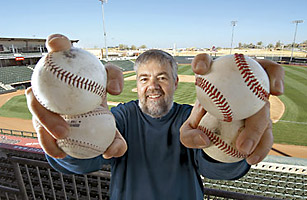
The Red Sox raised a few eyebrows by hiring maverick statistician Bill James in 2002. That was before the team won its first World Series in 86 years. When I asked our general manager, Theo Epstein, what he thought about James' impact on the game, he said, "The thing that stands out for me is Bill's humility. He was an outsider, self-publishing invisible truths about baseball while the Establishment ignored him. Now 25 years later, his ideas have become part of the foundation of baseball strategy. But where's Bill? Where's the gloating? Where's the publicist? He's like somebody outlining the Internet in the '80s and watching silently as it comes to pass."
What we now know as Moneyball and sabermetrics came from James, 56. He taught us, among other things, that individual ballparks have a profound effect on a ballplayer's production, that the largest variable determining how many runs a team will score is how many times the leadoff hitter gets on base, that much of what we perceive as pitching is actually defense. What I call Jamesian principles infuse our thinking with a perspective that is objective rather than subjective. What James demands is that we take the time to listen to what the game is telling us over and above what we are predisposed to believe.
Henry is the principal owner of the Boston Red Sox